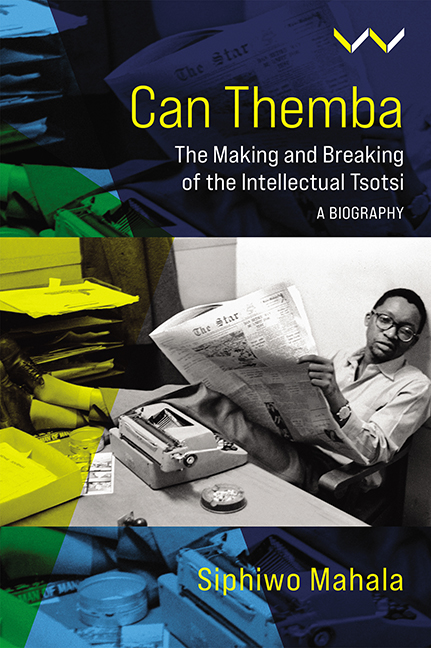Book contents
- Frontmatter
- Dedication
- Epigraph
- Contents
- List of Illustrations
- Acknowledgements
- Introduction
- PART I Death and Birth of a Scribe
- PART II ‘Live Fast and Die Young’
- PART III The ‘Intellectual Tsotsi’
- PART IV Dances with Texts: Writing and Storytelling
- PART V A Writer’s Immortality
- Postscript: The Three Burials of Can Themba
- Notes
- Bibliography
- Index
Postscript: The Three Burials of Can Themba
Published online by Cambridge University Press: 26 May 2022
- Frontmatter
- Dedication
- Epigraph
- Contents
- List of Illustrations
- Acknowledgements
- Introduction
- PART I Death and Birth of a Scribe
- PART II ‘Live Fast and Die Young’
- PART III The ‘Intellectual Tsotsi’
- PART IV Dances with Texts: Writing and Storytelling
- PART V A Writer’s Immortality
- Postscript: The Three Burials of Can Themba
- Notes
- Bibliography
- Index
Summary
Can won't die. He won't die. Actually, his writing is breathing life into him all over again.
Mothobi Mutloatse — Interview (2013)Can Themba has been buried three times since 1967; yet he refuses to die. Each burial gives him a new lease on life, and each new life opens a fresh chapter in scholarship on and appreciation of his work.
The availability of Themba's collected works in book form has enabled thorough engagement with his oeuvre, and restored his place in the annals of South African cultural heritage. His works have not only outlived him, but they continue to hold meaningful value as the decades pass.
The intergenerational dialogue that Themba spearheaded through his works is a clear affirmation of Mothobi Mutloatse’s assertion that Can Themba will never die. His writings keep him alive by engaging in a continuous dialogue with different generations, not only of readers, but also of writers and other practitioners in the arts sector who reimagine his works through graphics, stage plays and films.
Over the years, he has received numerous accolades that affirm his remarkable contribution to both the literary and journalistic landscapes. Obviously, it has only been possible to award these posthumously, but they give at least retrospective recognition, thus restoring part of the public memory.
One of the first such accolades Themba received was recognition by the Congress of South African Writers (COSAW) in 1989. COSAW was a national association of writers established in 1987,during the dying days of apartheid. This organisation aligned itself with the liberation struggle, particularly with the ANC as the biggest and oldest liberation movement in South Africa. The ANC and other major political parties were banned at the time, and it was mainly civil movements and cultural structures that kept the revolutionary fires burning at home, often spreading the philosophy and ethos of Black Consciousness.
The Black Consciousness Movement, whose major proponent was Steve Biko, flourished from the early 1970s through to the 1980s. This was the period when all anti-apartheid political organisations were banned, many political activists were detained, imprisoned and murdered, and more still were exiled. The banning of political activity, coupled with the banning of 46 writers under the Suppression of Communism Amendment Act, led to many writers and political activists streaming out of the country, particularly in the 1960s.
- Type
- Chapter
- Information
- Can ThembaThe Making and Breaking of the Intellectual Tsotsi, a Biography, pp. 217 - 222Publisher: Wits University PressPrint publication year: 2022



